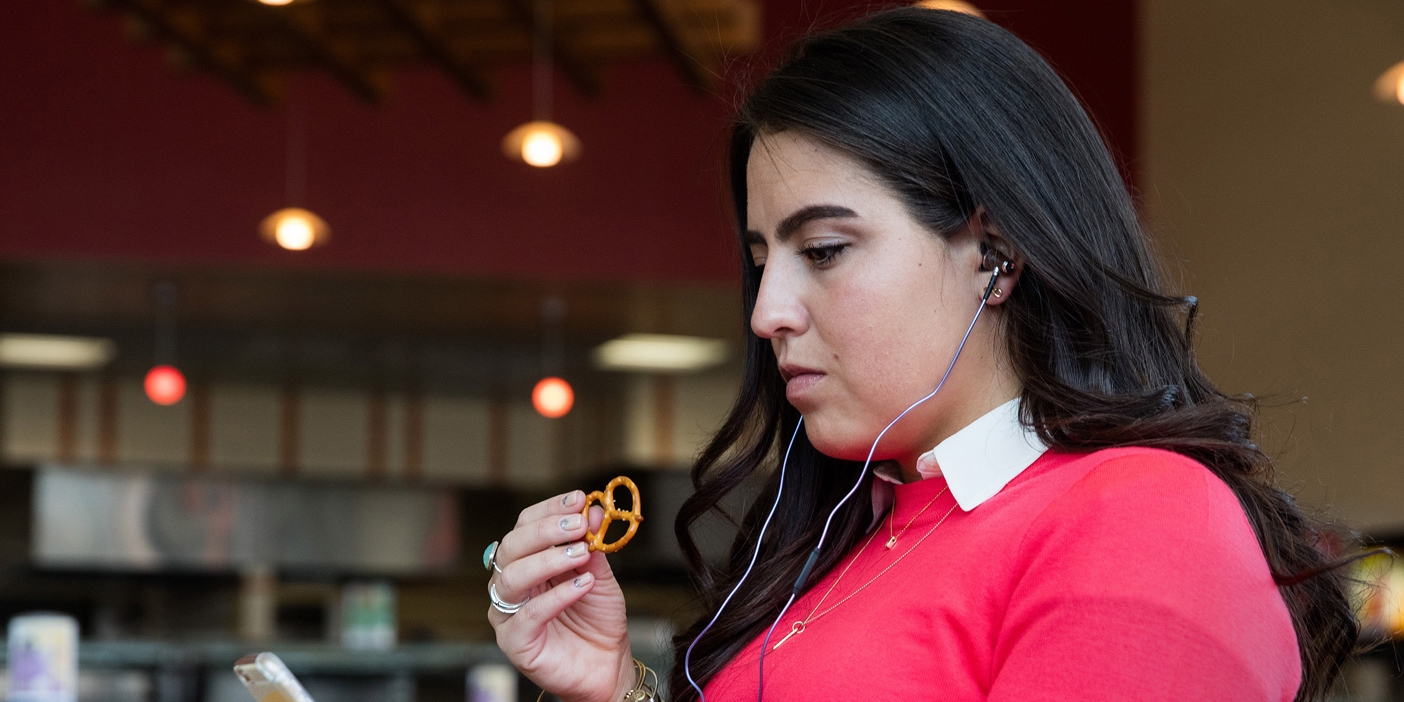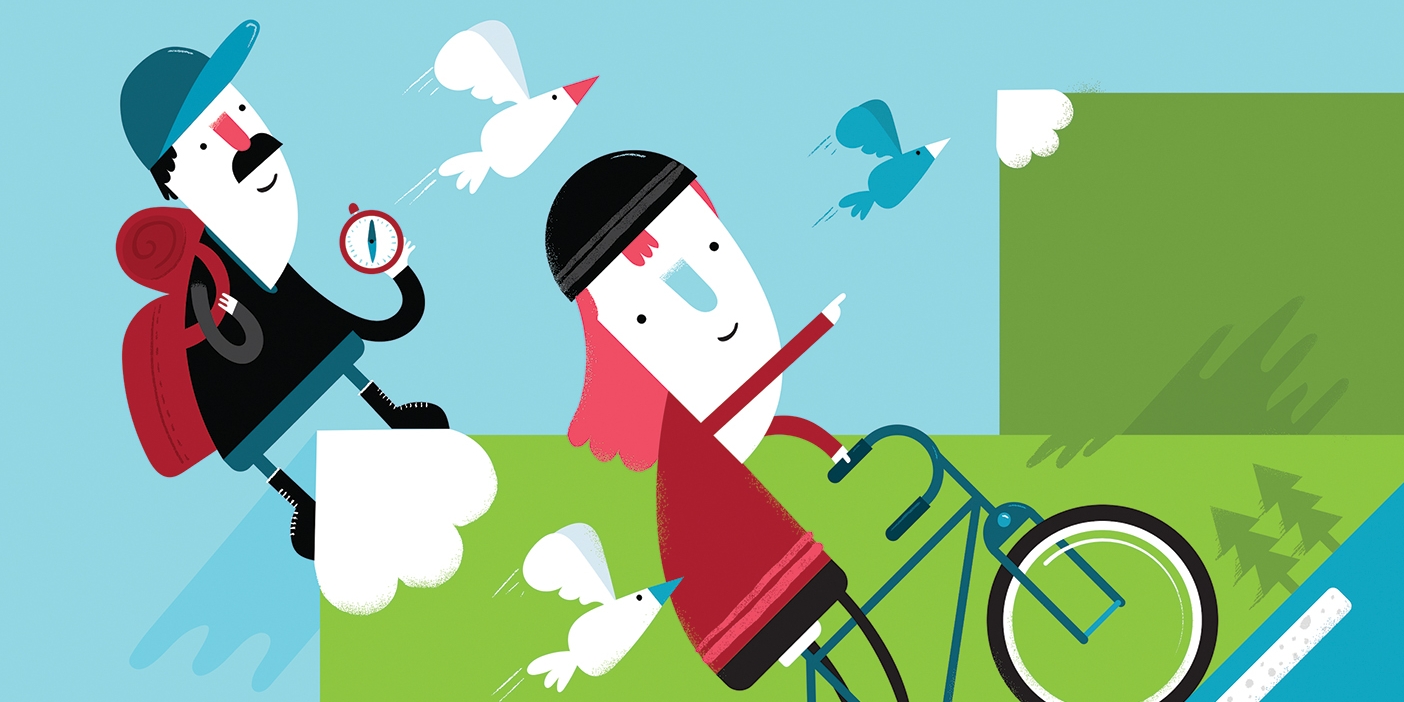BYU Pro(fessor) Tips
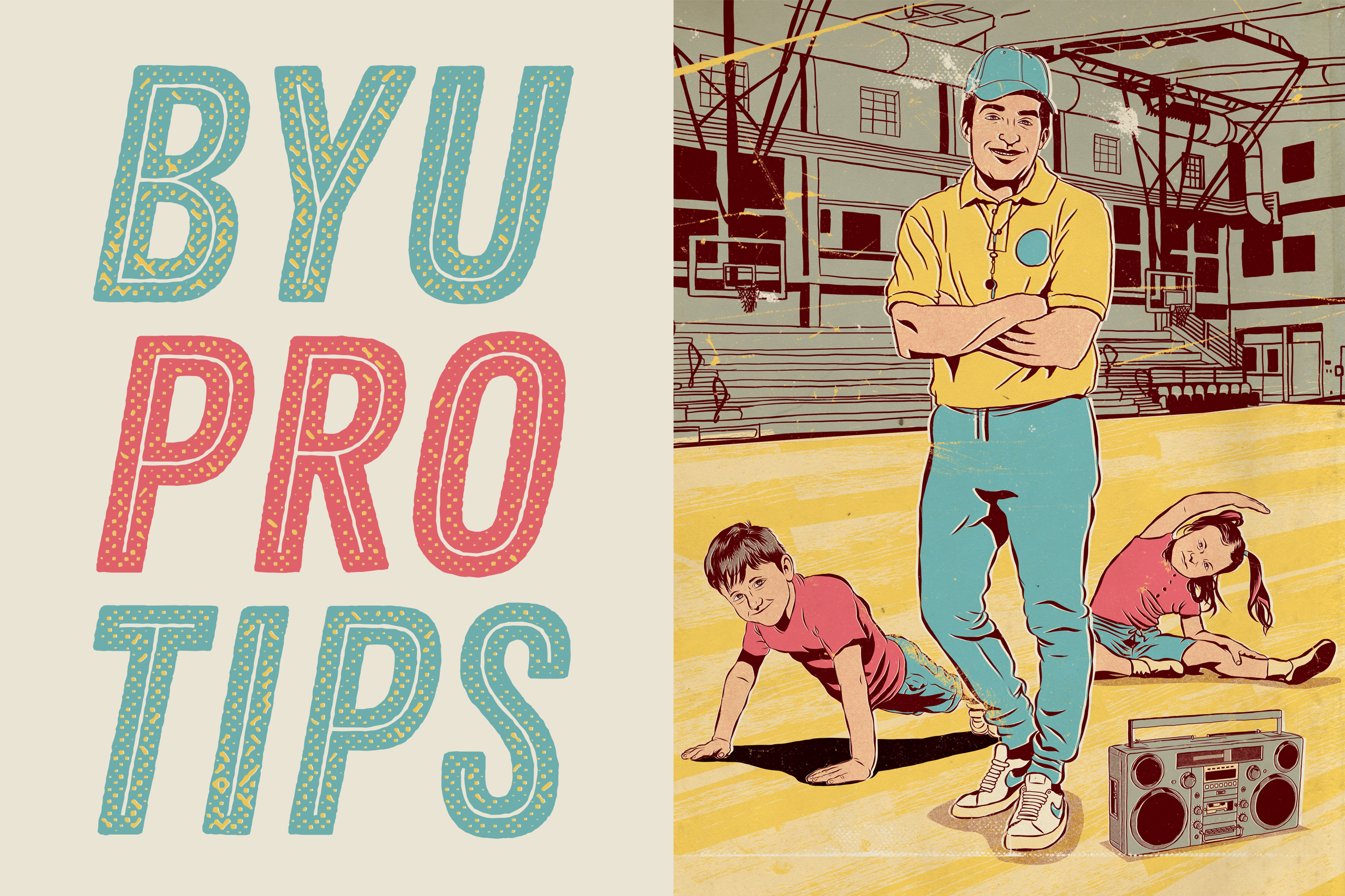
Reap the benefits of the wide breadth of BYU research.
By Peter B. Gardner (BA ’98, MA ’04) in the Summer 2018 Issue
Illustrations by Peter O’Toole
In their study and research, BYU experts are constantly chipping away at the problems of the world—from unlocking the secrets of good health to exploring heavens and earth to perfecting the formula for familial felicity. Not every finding has immediate application in everyday life—looking at you, theoretical mathematicians—but many do. Here’s a round-up of practical takeaways from BYU experts, life hacks that you can try out today.
Get Kids Jazzed About Exercise
Not every kid enjoys gym. In fact, some kids dread it. But all that can change with a simple trick, says teacher-education professor David C. Barney. He found that fourth graders were nearly six times more likely to be fans of exercise if music was played during gym. For best results, use upbeat tunes (120 to 160 beats per minute). Bonus tip from Barney: don’t publicly pick teams.
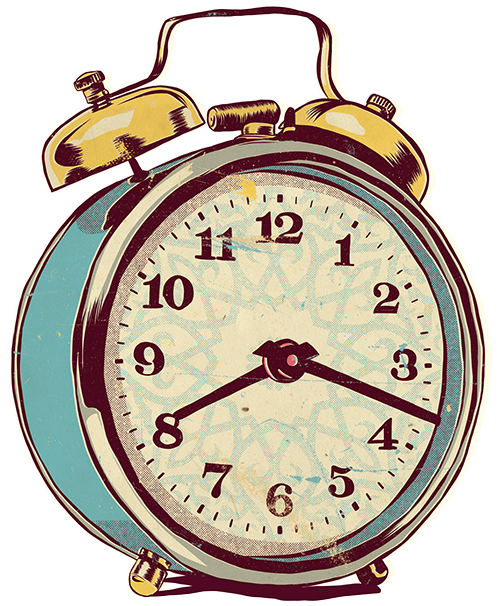
As Many Zs for As?
More teen sleep = higher test scores, right? It’s not that simple, say BYU economists Eric R. Eide (BS ’88, MS ’89) and Mark H. Showalter (BA ’86). Comparing standardized-test scores with students’ reported hours of sleep, they found that the average sleep for the highest-scoring kids shifted as the kids got older. For 12-year-olds it was almost eight and a half hours. For 16-year-olds? Just seven, far less than the nine-plus hours typically recommended for youth.
Them’s Fightin’ Words
You know the impulse: when Uncle Bob from across the political divide spouts off on a controversial matter, your gut says to come out with your rhetorical guns ablaze. But in their study of political rhetoric, BYU professors found that the more aggressive your metaphors (such as describing your cause as a “fight” or “battle” to be won), the more extreme Bob will become in his position. “Even if it’s metaphorical, and everyone knows it, there’s something that happens when you frame things in terms of battle or war,” says political-science professor Joshua R. Gubler (BA ’02), who was joined in the research by accountancy professor David A. Wood (BS ’05, MAcc ’05). For more influence, they recommend trying neutral synonyms like effort or work.
Long Live (Through) Relationships!
We all know smoking is bad. And drug abuse. And putting on pounds. But BYU researchers say social isolation is just as strong a risk factor for early death. Psychology professor Julianne Holt-Lunstad (BS ’94, MS ’98) and her colleagues found that those who nurture strong relationships (think family and close friends) or are otherwise socially integrated (talking to the mail deliverer, attending a book club, actively ministering in their ward) are healthier both mentally and physically.
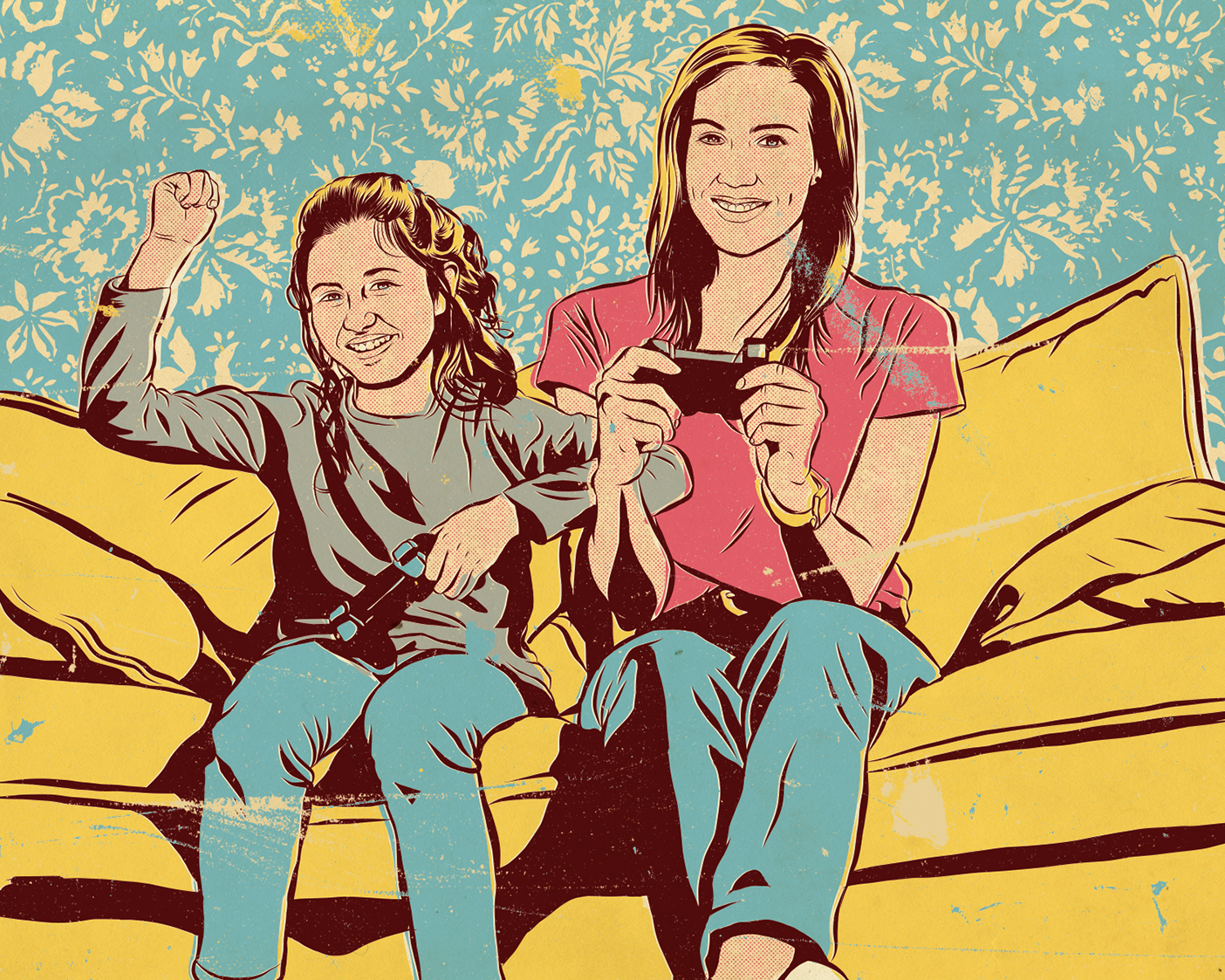
Super Mario Sisters
Parents typically aren’t keen on their kids spending hour after hour rescuing Princess Peach from King Koopa. And they’re right to worry, since time playing video games correlates with various negative outcomes, including aggression and decreased prosocial behavior. But research led by Sarah M. Coyne suggests that, rather than fret, parents can get better results by picking up a controller and joining in—especially with their daughters. Their study showed that parental coplay resulted in increased connectedness and prosocial behavior and reduced aggression.
Do Your Family (Health) History
“Sooo, who’s got high cholesterol?” It may seem a nosy question to toss out at the family reunion, but BYU nursing professor Deborah Olson Himes (BS ’91) says it’s the sort of probing that just might save your life someday. To benefit from precision medicine, you need to compile your genetic profile, in part by building a family health history. Start with all your first- and second-degree relatives (parents, siblings, aunts and uncles, cousins, and grandparents). Focus on any cancer and heart health, such as high cholesterol and heart attacks.
It’s a Stranger Thing
Family-life professor Laura Padilla-Walker is all for encouraging tweens to serve their families and friends, but she discovered something surprising: kids who help out score higher on measures of confidence and self-esteem. “Not all helping is created equal,” she says. “Something about helping strangers . . . impacts one’s moral identity or perceptions of self in a more significant way than helping friends or family.” Look for opportunities to serve strangers through resources like justserve.org.

The Textbook Case
You get what you pay for, right? Not necessarily when it comes to textbooks, according to a study by counseling psychology and special education chair Lane Fischer (BS ’79, MA ’82) and other BYU researchers. In a time when the cost of textbooks can exceed tuition for a semester of college, the team found that students who used free open-source textbooks not only performed just as well academically, but they had more cash in their pockets, allowing them to enroll in more credits the next semester than those who purchased traditional textbooks.
Think to Pray?
It’s an LDS Sunday School answer, sure. But prayer is also a pretty reliable response at the cathedral, synagogue, or mosque. A team of BYU researchers found that prayer—both individual and couple—leads to a host of positive outcomes in the marriages of respondents, no matter the religious or ethnic background. Patterns of prayer prompt personal change; foster humility and positivity; and facilitate communication, conflict resolution, and unity for couples, say researchers Trevan G. Hatch (BA ’08), Loren D. Marks (BS ’97, MS ’99), and David H. Dollahite (BA ’83, MS ’85).
Is Social Media Bad for You? Depends
Recent studies confirm what many of us had already suspected—social networking isn’t all double rainbows and kitten GIFs. Regular social-media use has been tied to feelings of depression, anxiety, and diminished self-worth. But information-systems professor James E. Gaskin (BS ’08, MISM ’08) has found that those effects vary widely, depending largely on users’ participation. For people with high stress or low personal resilience, passive engagement—merely scrolling through posts for entertainment or escape—can be particularly harmful. While emotionally resilient users are less vulnerable to this environment of intense comparison, Gaskins says all users would do well to keep their social-media usage active, rather than passive, with two-way sharing of appropriate information.
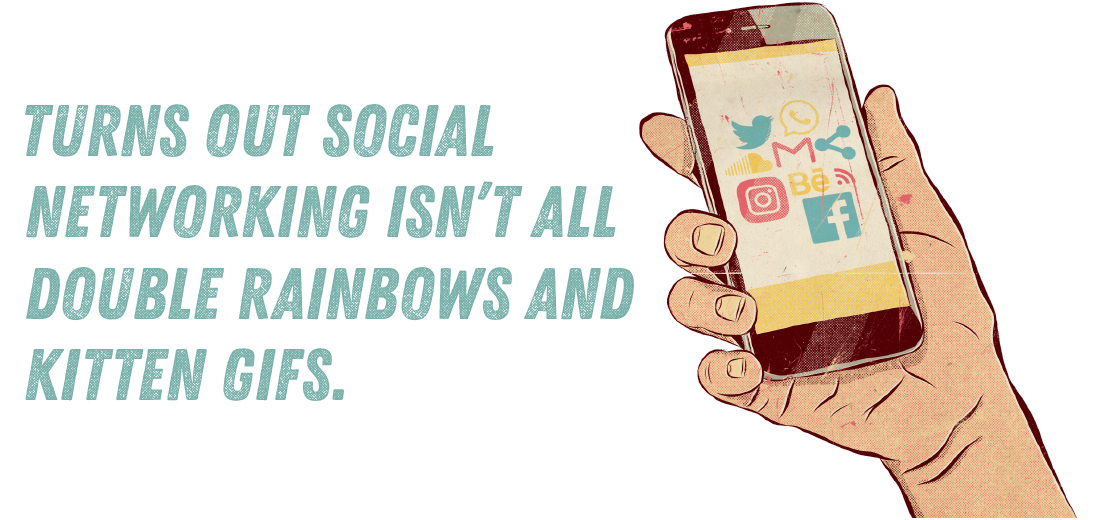
Give It To ’Em Straight
Which is better? Five minutes of your supervisor building you up before announcing your layoff or a simple, “I’ve got some bad news. . . .” BYU linguist Allan M. Manning’s research found that bad-news recipients far prefer approaches that minimize the sugarcoating. He says padding the bad news with positive reinforcement mainly serves the squirming news bearer.
More Crunches, Fewer Calories
More crunching just might improve your health, says marketing professor Ryan S. Elder, but he’s not talking about sit-ups. Noisy eating, he found, makes eaters more aware of the amount of food they are eating, which can be a good thing if one is trying to reduce calorie intake. Eaters who listen to music or television at mealtime may mask that effect. So turn down the volume and enjoy the crunch.
Jog Your Memory
Having trouble remembering where you put your keys or that guy’s name or why you went in that room? It could be the result of chronic stress, which weakens the synapses between neurons in your brain. Jeff G. Edwards (BS ’94), a professor of physiology and developmental biology, suggests lacing up your running shoes. His research found that exercising during stressful periods keeps the synapses healthy—and might even help you find your car in the parking lot.

Time the Veggies
The average kid and the average vegetable are not friends. But economist Joseph P. Price IV (BA ’03) says it may all be a big misunderstanding. In a study of Utah elementary-school kids, he found that one simple trick—moving lunch from before recess to after—led to big increases in fruit and vegetable consumption. He says it comes down to hunger and priorities: after recess the kids’ appetites had grown, and they weren’t rushing to be first on the monkey bars. At home parents can put healthy foods out when their kids are hungriest and keep them from rushing at dinnertime by requiring them to stay at the table for a set period of time. “Not only will you have more family conversations,” he says, “but your kids will be more likely to eat the healthy things on their plate.”
Check in, Don’t Check Up
Managing the parental relationship with emerging-adult children can be touchy: grown kids want autonomy (“I got this”) but typically still need occasional guidance and support (“Help!”). Family-life professor Larry J. Nelson (BS ’94, MS ’96) says a few parental tricks can help strike the right balance: Start with communications that are more of a “check in” (“How are you?”) than a “check-up” (“What were you doing last night?”). When there’s a crisis or a big decision to be made, parents need to resist the urge to don their super suit and save the day. Instead of parents offering unsolicited advice to their emerging adult, Nelson says they should begin by asking where their child is in resolving the challenge, then listen carefully, ask helpful questions, empathize, and express confidence in the child’s ability to make a good decision. Handled this way, says Nelson, parental interactions can help young people flourish in their transition to adulthood.
Send comments on this article to magazine@byu.edu.


